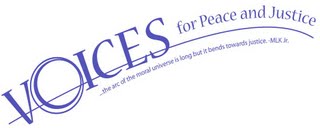| Founding History of CKCPJ, 1983 - 1991
by Betsy Neale, CKCPJ founding Executive Director
- See also CKCPJ Highlights since 1983
In the fall of 1983 I moved to Lexington from Maine where I had been active with the American Friends Service Committee and the Nuclear Freeze movement. I found no organization here working on that issue. Instead, a number of small groups worked on peace and justice issues as separate entities. I wanted to bring these organizations together to increase both their awareness of each other and their effectiveness. Will Hayes, retired president of Alice Lloyd College, mentored me by supplying me with names of individuals and groups.
As I met with these groups, they expressed interest in the idea of forming an umbrella organization, and in November 1983, the Central Kentucky Council for Peace and Justice was created.
In those early years the Council included peace and justice groups from a number of faiths including: Roman Catholic, Disciples of Christ, Presbyterian, Episcopal, Unitarian, Baha'i, Jewish, and Quaker. It included organizations working on peace and justice in Central America, the Philippines, and Iran, and local chapters of the Fellowship of Reconciliation, the Democratic Socialists of America, the ACLU, Physicians for Social Responsibility, and the United Nations Association. In addition, a local chapter of the Nuclear Freeze Campaign was founded and I became a member of the Council.
During the 1980s presidency of Ronald Reagan, there was widespread fear that the U.S. arms buildup was a threat to global peace, especially through its program to install Cruise missiles in Europe. In those years many of us also opposed U.S. interventions in Central America. Reactionary policies of the U.S. government fostered the growth of the peace and justice movement nationally and here in Lexington. It's ironic to remember that we thought the Reagan administration was as bad as a presidency could get!
One incident from those days shows progress achieved in one area of social justice. In 1987, when there was minimal support for the civil rights of lesbians and gay men, a national gay rights march was held in Washington. A co-chair of the Council was a lesbian who was not out in public life or to most of those on the Council board.
When the board was asked to endorse the march, it was unable to find consensus. You can imagine how painful this was for our co-chair. Painful too was the fact that those who opposed the endoresement had no idea of how personal the issue was for one of their own.
The refusal to endorse only made her less inclined to be open with the board. Yet, we continued to grapple with the issue, and at a later meeting the board agreed to: 1. place an ad in the Herald-Leader at the time of the march affirming support for the human rights of lesbians and gay men, 2. sponsor a self-education workshop on lesbian and gay issues, and 3. begin outreach to the gay community.
I served as the Executive Director of the Council from its early days until about 1991 when I went to graduate school, and Michael Fogler became the Executive director.
originally published in Peaceways, May 2008. | 
